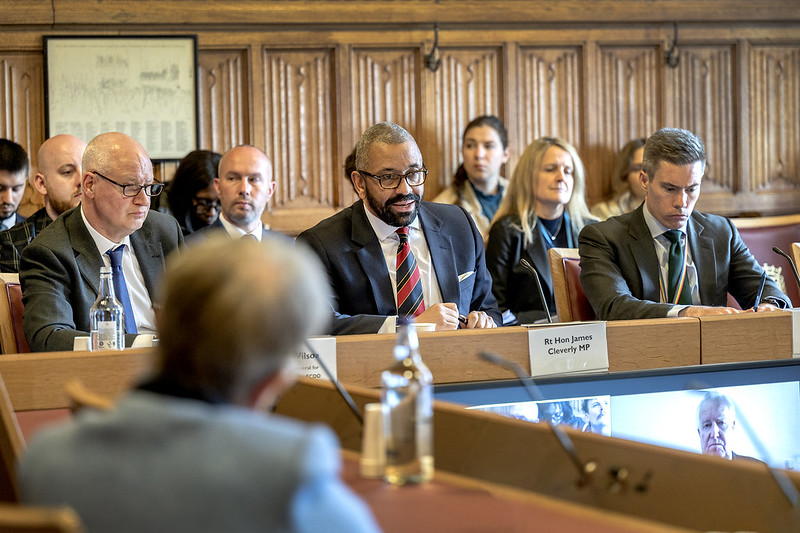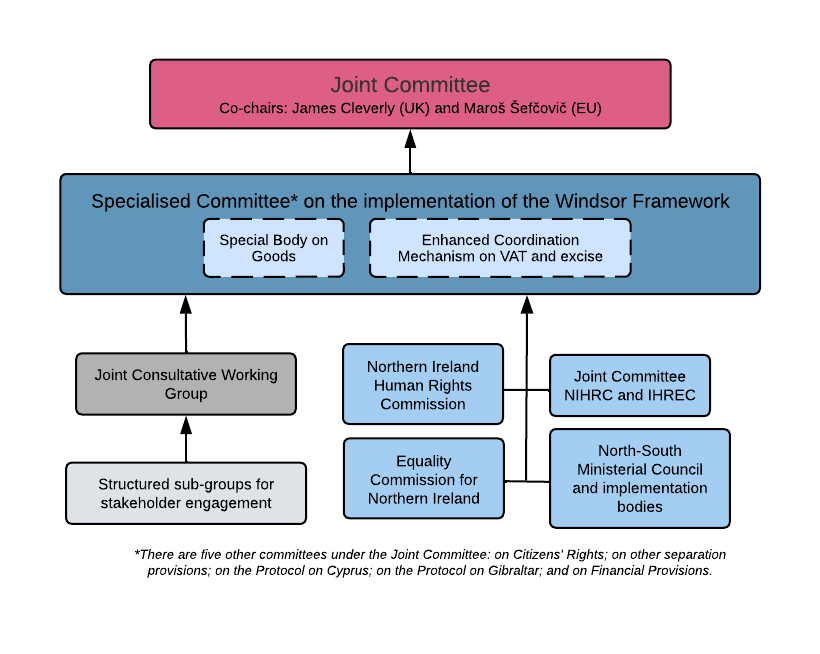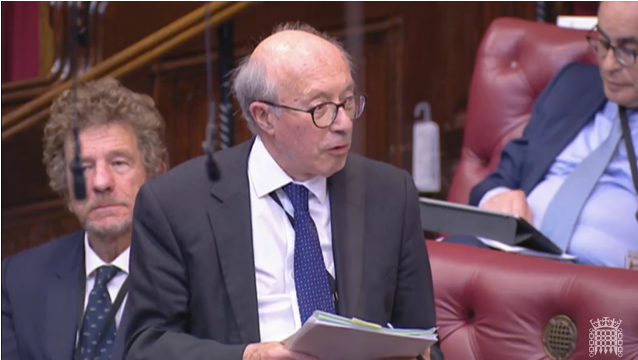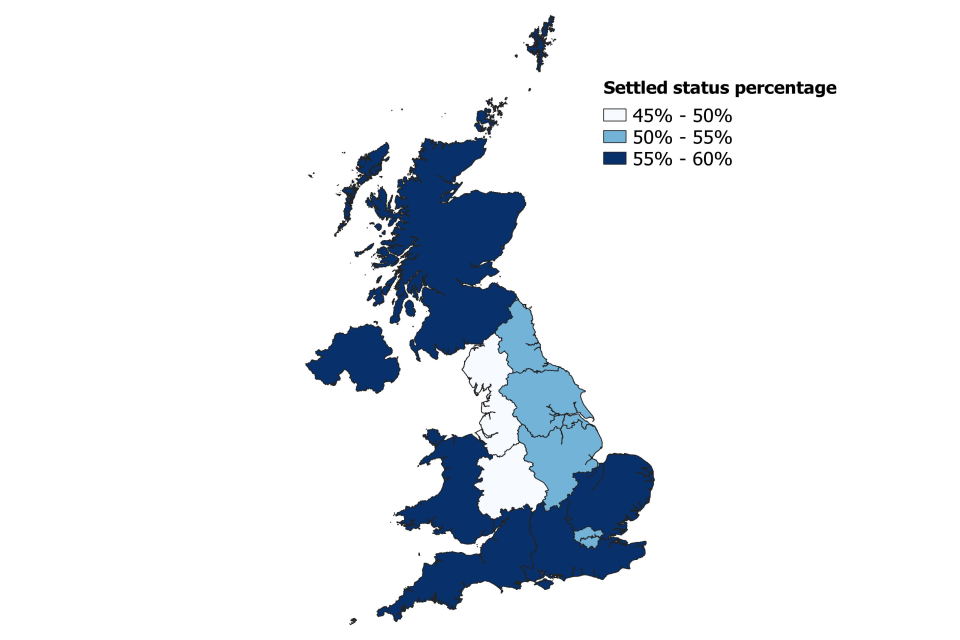Brexit & Beyond newsletter
22 May 2023
 Welcome to the 22 May 2023 Brexit & Beyond newsletter
Welcome to the 22 May 2023 Brexit & Beyond newsletter
The Foreign Secretary James Cleverly gave evidence to peers on the Windsor Framework. The Retained EU Law Bill is proceeding through the final stages in the House of Lords, and various amendments have been made. The European Commission has adopted a draft MoU on EU-UK cooperation on financial services. The Lords European Affairs Committee took evidence on citizens’ rights. Carmakers have raised concerns about the impact of trade rules on electric vehicle manufacturing in the UK.
Foreign Secretary gives evidence on the Windsor Framework
On Tuesday, the Foreign Secretary James Cleverly gave evidence to the Lords Sub-Committee on the Protocol on Ireland/Northern Ireland. He said the EU and UK reached an end point in the Windsor Framework where they are both “accepting a degree of theoretical risk that we think is very manageable in the real world.” 
Foreign Secretary James Cleverly speaking to the Lords Protocol on Ireland/Northern Ireland Sub-Committee | Source: © House of Lords 2023 / photography by Annabel Moeller
The Stormont Brake, Cleverly said, is “incredibly important…we had to demonstrate that things would not be done to the people of Northern Ireland by external powers without them having a voice, and for the voice to be really powerful.” He emphasised that the new mechanism is not to be used lightly and that the UK Government is “bound to take it very seriously…but ultimately we want to avoid creating circumstances where there is the necessity of its use.” Cleverly said part of this is direct engagement with NI stakeholders, which will inform the work of the EU-UK Joint Committee. He stated that formal political engagement “will be fully effective only once Stormont is back up and running.” The First Minister and deputy First Minister attend the Joint Committee meetings – a commitment made by the Government in New Decade, New Approach. Cleverly suggested the Brake could “focus minds not just in Stormont but in Westminster and Brussels”: if decisions are likely to have a significant impact on the people of Northern Ireland, this would be flagged to the EU. He called it an insurance policy: “it is not something you would want to deploy willy-nilly, but it is there for a reason.”
Cleverly was emphatic that the Government would not seek to renegotiate the Windsor Framework, arguing that the UK got movement “that for many years the Commission told us was impossible”. He said the political risk was not only on the UK side, and that the EU “made some really bold choices that ultimately have landed…but that was certainly not a guarantee.” He said he felt “it was the best deal that we could get that was also sellable within the EU.”
Lord Dodds (DUP) noted the checks and requirements associated with the red and green lane system, asking how that squares with the Prime Minister’s statement that “any sense of an Irish Sea border” has been removed. Cleverly explained to the committee that certain manufactured goods tend to move quite freely within the island of Ireland, and “therefore that is why that treatment is the most appropriate”. He added, “Northern Ireland’s proximity to the single market and its part of the United Kingdom mean that complete perfection in all instances is not ultimately deliverable, but we have in very large part made good on that promise to eradicate that sea border in Northern Ireland.”
Cleverly said the decision for a UK-wide labelling regime is partly practical, partly philosophical: retailers said that they would prefer a UK-wide regime, and as NI is a part of the UK, “it seems to [him] logical that for something we are asking Northern Ireland to do we should ask the UK to do.” (See the Brexit & Beyond website for a timeline, including the stages for the introduction of the UK-wide labelling regime for certain products)
The Lords sub-committee has been asking the Government to log regulatory divergence between Northern Ireland and Great Britain which arises from EU and domestic legislation. The Minister said the Office for the Internal Market will monitor the impact for NI of future regulatory divergence and this means it will become a “repository”. He said NI authorities can request that the OIM investigate concerns they raise and the UK Government has to provide a full response to any OIM reports. He suggested the OIM would be a “clearing house” for any divergence.
In the Government’s Command Paper on the Windsor Framework, it states the agreement removes 1,700 pages of EU law. Ministers have been pressed for a list of these laws. Cleverly said some disapplications are “circumstantial” and that “it is not quite as simple as an A-to-Z list of things… there are a number of areas, particularly when it comes to the functioning of the red and green lanes, that would be conditional on certain circumstances, and they are not that easy to put into a list.”
The governance structure for the Windsor Framework
On the creation of the structured sub-groups to be set up for stakeholders to input into the Framework’s governance, Cleverly said this was considered at the recent Specialised Committee meeting and should be “quite Bauhaus in its design”, with form following function. He said, “I do not think there is any incentive for us to be prescriptive or limiting on the composition of the sub-groups.” The QUB post-Brexit governance project has published an explainer on the EU-UK structures and commitments for engagement with stakeholders.
The Foreign Secretary also submitted written evidence to the committee and is expected to provide further written evidence on various topics: the implications of the Windsor Framework for the wider UK-EU relationship, a list of goods not subject to EU VAT, the role of the OIM on divergence, a “pretty comprehensive” list of the 1,700 pages of EU law which the Framework removes, and on the intersect between Common Frameworks and the Windsor Framework.
Domestic legislation?
The Foreign Secretary said that the Government will work to address outstanding practical measures, which “may need to be tidied up through domestic legislation”. At Question Time on Wednesday, DUP leader Sir Jeffrey Donaldson said EU law applying to NI manufacturing, and the UK’s future border operating model, “could potentially create further barriers to trade between Northern Ireland and Great Britain”. He asked that the Government “will in law protect Northern Ireland’s ability to trade freely within and with the rest of the United Kingdom.” The Deputy Prime Minister Oliver Dowden said, “We have already shown a willingness to legislate to protect Northern Ireland’s place within the Union, and we are committed to providing exactly the protections to which the right hon. Gentleman has referred in respect of its unfettered access to the whole United Kingdom market.”
Amendments to the Retained EU Law Bill in the Lords
Report stage of the Retained EU Law (REUL) Bill took place in the Lords on 15 and 16 May. Last week Business and Trade Secretary Kemi Badenoch announced that the Government is amending the Bill: under the original Bill, most REUL would fall off the statute books at the end of 2023. The Minister’s amendment, which was passed, replaces this with a list of 600 Retained EU Laws which will fall at the end of the year.
Peers put forward amendments to the Bill, and the Government was defeated on several occasions. An amendment was made for significant changes to REUL to be subject to greater parliamentary scrutiny: these laws would be referred to a Joint Committee of both Houses of Parliament. If the Joint Committee finds that the revocation of any item of legislation represents a substantial change to current UK law, a Minister of the Crown must arrange for the revocation of such legislation to be debated on the floor of each House and voted on. If the revocation of any legislation is not approved by both Houses, it is retained.

Lord Hope of Craighead, who proposed various amendments to the Bill | Source: UK Parliament
The House of Lords also voted to give devolved governments, rather than Westminster ministers, the final say on whether EU rights should be kept. A new clause was inserted to give Parliament and the devolved legislatures the final decision as to whether or not rights, powers, liabilities etc. retained by the EU (Withdrawal) Act 2018 should be revoked at the end of 2023. For example, a UK or Northern Ireland Minister can make a statement in Parliament/the Northern Ireland Assembly before the end of October 2023 identifying which rights will expire by the end of the year. If Parliament/the Assembly were to decide that those particular rights should not expire, they will be retained.
An amendment introducing safeguards and conditions on changes to REUL regarding environmental protections and food standards was passed, while an amendment regarding workers’ protections was not. Third reading in the Lords is to take place today, and on Wednesday the Commons will decide whether to accept the Lords amendments. The House of Lords has published a summary of the developments on the REUL Bill.
EU-UK cooperation on financial services
The European Commission adopted a draft Memorandum of Understanding (MoU) to establish a framework for structured regulatory cooperation on financial services with the UK. This would not directly provide greater UK-EU market access, but would facilitate dialogue and cooperation. The MoU must now be approved by the EU Council. The House of Lords European Affairs Committee published its report into the EU-UK relationship in financial services in June 2022. The report noted that most witnesses to the inquiry identified the dispute over the implementation of the Protocol on Ireland/Northern Ireland, as “the key obstacle to the conclusion of the MoU.” The report’s findings were debated on 17 May. Mairead McGuinness, European Commissioner for Financial Services, said, "The Windsor Framework allowed the EU and the UK to open a new chapter in our partnership based on a spirit of mutual trust and cooperation. I am confident that our relationship and future engagement in financial services will be built on a shared commitment to preserve financial stability, market integrity, and the protection of consumers and investors." Treasury Minister Baroness Penn welcomed the news of the Commission’s adoption and said, “the Treasury stands ready to sign the MoU, and we look forward to operationalising the forum as soon as possible this year.”
Citizens’ rights
On Tuesday, the Lords European Affairs Committee took evidence on citizens’ rights. In the Withdrawal Agreement, the EU and UK guaranteed that the rights of EU citizens in the UK, and UK citizens in the EU (who were legally resident there before Brexit) would be protected. Monique Hawkins of the campaign group the3million called the current situation “somewhat stuck”. She said there is a “very steady backlog” of applications to the EU Settlement Scheme, which could take six years to clear at the current rate of processing. Jane Golding, Co-Chair of advocacy group British in Europe said, “in general we feel that resources allocated to the rights of UK citizens in the EU are being reduced drastically at the same time as we are now seeing a rise in serious and complex cases.” Dr Kathryn Chamberlain, Chief Executive of the Independent Monitoring Authority, which was set up to oversee the UK’s commitment on citizens’ rights, said, “Given that the number of EU citizens in the UK was so many more than expected, getting to where we are now has been a significant achievement.” She echoed concerns from the other witnesses, saying the greatest challenges are in the complex cases.

UK Government’s statistics on concluded settled status applications up to December 2022, published February 2023. 111,900 (2%) of concluded applications were from Northern Ireland. Source: UK Government EU Settlement Scheme quarterly statistics
Hawkins explained some issues around the UK’s new Electronic Travel Authorisation (ETA) scheme. Overseas visitors to the UK, who do not currently need a visa, will be required to obtain pre-authorisation in the form of an ETA. This does not apply to citizens of Ireland or the UK. She said, “our cohort are not visitors, so they cannot apply for it. When they have gone abroad and are trying to come back, they need somehow to convince the airline that they do not need an ETA.” She said the new system is not ready for the start of the ETA rollout.
There is no independent body equivalent to the Independent Monitoring Authority to support UK citizens in the EU. Jane Golding said they are worried about this, “because there are a number of problems with the current monitoring systems.” The European Commission is responsible for monitoring this element of the Withdrawal Agreement and the Commission’s team “is small but expert…but it has limited resources, staff and budgets.” She said the next best thing to an EU authority would be for the Commission to increase the resources devoted to the rights of UK citizens.
EU-UK trade rules and electric vehicle manufacturing
The Prime Minister has said the Government is in talks with the EU about the trade rules which have caused concern among carmakers. Under the rules of origin in the EU-UK Trade and Cooperation Agreement, a certain percentage of a company’s product must be made or processed in the UK to qualify for zero tariff exports. The lack of sufficient battery supply in the UK and Europe means a competitive disadvantage, and a potential impact on operations in the UK, if the cost of electric vehicle manufacturing becomes uncompetitive and unsustainable. Stellantis, which owns Vauxhall, Fiat and Peugeot, has warned that it requires more time to source batteries from Europe; most are currently imported from Asia. This issue was debated in the Commons on Wednesday and the Commons Business and Trade Committee will hold an evidence session tomorrow on batteries for electric vehicle manufacturing. Meanwhile, Labour leader Sir Keir Starmer says he would seek to lower trade barriers with the EU within 18 months of entering Government.
Other news
- The EU’s Carbon Border Adjustment Mechanism (CBAM) was signed into force by the Council and Parliament. It will apply from 1 October 2023. The CBAM may apply in Northern Ireland under the Protocol/Windsor Framework. The Lords European Affairs Committee heard from witnesses that this could “thicken the sea border” by introducing additional trade friction between NI and GB, and “could also constitute a significant barrier for companies in Northern Ireland wishing to trade with the Republic of Ireland”. The Committee’s recent report notes that it is not yet clear how the Windsor Framework may affect this.
- QUB’s post-Brexit governance project has published a consolidated version of the Protocol showing where it has been amended by the Windsor Framework.
- The Lords Sub-Committee on the Protocol on Ireland/Northern Ireland has published a report on the PEACE PLUS Programme 2021–2027 Financing Agreement, which details the financial contributions of each party to the scheme, which has been operating since 1995, and aims to support peace and reconciliation and promote economic and social stability in Northern Ireland and the border regions. The UK Government has confirmed a contribution of more than £730 million - almost 75% - to the PEACE PLUS Programme’s budget. This figure includes contributions from the NI Executive; contributions from the Irish Government and EU brings the total budget to almost £1 billion.
- On 15-17 May, Members of the European Parliament’s Committee on Fisheries visited Ireland to consider challenges posed by Brexit.
- On Wednesday, the Commons European Scrutiny Committee held a session on PESCO and EU-UK defence cooperation.
Sign up to Brexit and Beyond
Sign up for our regular Brexit and Beyond newsletter and get all the latest developments and news delivered straight to your inbox.



